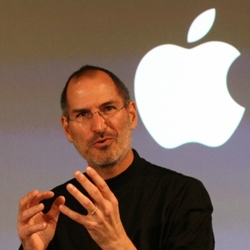Of Idols and Men
- August 29, 2011
- Posted by: Rochelle
- Category: Brand + Design
 Steve Jobs put the cool in technology.
Steve Jobs put the cool in technology.
But that’s not why he’s on my short list of business idols.
It’s because he committed himself early to one simple, emotionally enticing principle: to make technology easy.
Relentless dedication to one powerful idea.
He got personal branding right. He focused not on himself, but on his idea. He is constantly shaping his vision into experiences and products for his customers and the Apple team.
To wit (from the man himself):
1985: “The most compelling reason for most people to buy a computer for the home will be to link it to a nationwide communications network. We’re just in the beginning stages of what will be a truly remarkable breakthrough for most people––as remarkable as the telephone.”
1996: “Design is a funny word. Some people think design means how it looks. But of course, if you dig deeper, it’s really how it works.”
1998: “That’s been one of my mantras — focus and simplicity. Simple can be harder than complex: You have to work hard to get your thinking clean to make it simple. But it’s worth it in the end because once you get there, you can move mountains.”
2000: “We made the buttons on the screen look so good you’ll want to lick them.”
2004: “And it comes from saying no to 1,000 things to make sure we don’t get on the wrong track or try to do too much. We’re always thinking about new markets we could enter, but it’s only by saying no that you can concentrate on the things that are really important.”
2007: “Every once in a while a revolutionary product comes along that changes everything. … One is very fortunate if you get to work on just one of these in your career. Apple’s been very fortunate it’s been able to introduce a few of these into the world.”
Want to channel Steve? Boil down your vision to one exquisitely simple idea that excites you and engages your best audience. And stick with it. No matter what.







“You must be the change you want to see in the world.” Gandhi said, at lived it. So does Steve Jobs.
Interesting concept with job as he took a concept and created a product.
It becomes a bit more dicey when the product involves one services, an intangible, if you will. I also note that Jobs suffered the indignity of failure several times; that also means he tried and retooled.
I know since I left government service were I sometimes need to explain (market) my services to folks with little or no (at least that remains their view – I can explain another time why almost every act one does crosses into politics and government) government involvement beyond paying taxes. I know bottom line I demonstrate an ability to get things done — something transferrable to other fields, and perhaps understandable in an abstract sense. However, even if I point to a well-known success such as defeating a bad policy that (the policy) attracted much attention in the news, it may not alway give the full flavor to someone who, knows me reasonably well or even better and might sit on a board of a larger group who might need my services and does not think to suggest me during a discussion that involves bringing in someone like me as an advisor/ consultant.
It remains a constant challenge as I self-limit my work and consulting to exclude projects, matters and public figures where I do agree the agenda. Most will see themselves as a professional and take on a project. Indeed, in the law, our system expects all sides to enjoy competent council. Interesting dilemma.
So I found the need to use the same approaches I used in government to advance issues, defeat bad polices and promote the advancement of good people in positions of public service, to define what I do now that I work on the outside — albeit doing much the same. I suspect if I look back to my time in government, I probably did apply some of those approaches to assist my efforts and improve my ability to achieve my professional goals.